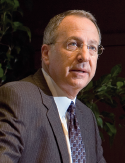WHEN WE THINK OF CORNELL students we tend to think of undergraduates, who now number more
than 13,000 on our Ithaca campus. But those engaged in graduate and professional studies are also an important part of our campus population, making up about a third of our student body. More important than sheer numbers, however, graduate education in its many ramifications defines the research university and is increasingly a focus for students, faculty, and administrators at Cornell.
 Our graduate and professional students come from around the world and contribute greatly to the University's diversity, thus enriching the Cornell experience for all. In the 2006-07 academic year, nearly 18 percent of our professional students and more than 40 percent of our graduate students came from outside of the United States, compared to approximately 8 percent of undergraduates. These graduate and professional students play a multifaceted and critical role in all aspects of our university. They are not only preparing themselves to become the next generation of leaders in their fields—whether in industry, academia, or other areas of national and international importance—but are also serving as teachers, mentors, and role models to undergraduates, particularly in their positions as teaching and research assistants and as instructors for freshman writing seminars. Graduate and professional students are active in outreach and public service on campus and beyond, and they serve as resident fellows in our West Campus residences and as "near-peer" fellows for our fraternities and sororities. And, as they develop their knowledge and skills as investigators and scholars, they become effective partners with faculty members and postdoctoral associates in the process of discovery.
Our graduate and professional students come from around the world and contribute greatly to the University's diversity, thus enriching the Cornell experience for all. In the 2006-07 academic year, nearly 18 percent of our professional students and more than 40 percent of our graduate students came from outside of the United States, compared to approximately 8 percent of undergraduates. These graduate and professional students play a multifaceted and critical role in all aspects of our university. They are not only preparing themselves to become the next generation of leaders in their fields—whether in industry, academia, or other areas of national and international importance—but are also serving as teachers, mentors, and role models to undergraduates, particularly in their positions as teaching and research assistants and as instructors for freshman writing seminars. Graduate and professional students are active in outreach and public service on campus and beyond, and they serve as resident fellows in our West Campus residences and as "near-peer" fellows for our fraternities and sororities. And, as they develop their knowledge and skills as investigators and scholars, they become effective partners with faculty members and postdoctoral associates in the process of discovery.
From my meetings with the leadership of the Graduate and Professional Student Assembly (GPSA) over the last year and a half, I have come to appreciate that our graduate and professional students are talented, high-integrity individuals who work not only on their own behalf but also to have a positive impact on graduate and professional education at Cornell for generations to come. And in addition to these activities, many are balancing family responsibilities with their studies.
In general, I believe the graduate student experience at Cornell is superb and that our students are treated with respect, whether in terms of workload, compensation, or other considerations. However, areas of concern remain, and these are currently the focus of active investigation by the administration, faculty, and graduate and professional students themselves. The GPSA's Vision Statement for a Graduate Community Initiative, presented to the Cornell community and the Board of Trustees last March, outlined three areas of need: an expanded graduate student center; a career resource center for students and their families (to help prepare for academic and professional careers and to serve spouses/partners while in Ithaca); and more opportunities to develop contact with and learn from graduate and professional students and professors outside of their immediate field and thereby to develop social cohesion.
The GPSA also identified some broader issues of concern including housing, transportation and parking, childcare, mental health, and the special needs of graduate and professional students in locations other than Ithaca (including Geneva, New York City, and Qatar). Mao Ye, a graduate student in economics who is a student-elected trustee, has also spoken publicly, as have others, on the need for more affordable health-care benefits for graduate student families.
Since the GPSA issued its vision statement, Graduate Dean Alison Power and Vice President Susan Murphy '73, PhD '94, have been working diligently with students and administrative units across campus to evaluate our services to graduate students, focusing on such areas as career services, graduate student housing needs, and communication among the students and across the campus. David Hajjar, executive vice provost at Weill Cornell Medical College and dean of the Weill Cornell Graduate School of Medical Sciences, is working on similar issues with the graduate student population at the Medical College.
In addition, it is clear that we need more graduate fellowships if we are going to recruit and retain the best graduate and professional students, recruit and retain the best faculty, further enhance our already strong research and teaching programs, and improve the overall graduate student experience. These goals are important to graduate and professional students and postdoctoral associates on all of our campuses. I invite you to share your thoughts with me and my colleagues on ways in which we can continue to attract and retain the world's best graduate and professional students and postdoctoral associates, and thereby ensure the quality of the Cornell experience.
— President David Skorton
david.skorton@cornell.edu


